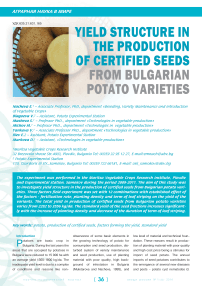Yield structure in the production of certified seeds from bulgarian potato varieties
Автор: Nacheva E., Blagoeva V., Masheva S., Michov M., Yankova V., Iliev E., Markova D.
Журнал: Овощи России @vegetables
Рубрика: Аграрная наука в мире
Статья в выпуске: 1 (22), 2014 года.
Бесплатный доступ
The experiment was performed in the Maritsa Vegetable Crops Research Institute, Plovdiv and Experimental station, Samokov during the period 2009-2011. The aim of this study was to investigate yield structure in the production of certified seeds from Bulgarian potato varieties. Three factors field experiment was set with 12 combinations with established effect of the factors - fertilization rate, planting density and term of leaf striping on the yield of the variants. The total yield in production of certified seeds from Bulgarian potato varieties varies from 2282 to 3556 kg/da. The standard yield of the seed fractions increases significantly with the increase of planting density and decrease of the duration of term of leaf striping.
Potato, production of certified seeds, factors forming the yield, standard yield
Короткий адрес: https://sciup.org/14025059
IDR: 14025059
Текст научной статьи Yield structure in the production of certified seeds from bulgarian potato varieties
observance of some basic elements in
low level of material and technical foun-
P otatoes are basic crop in Bulgaria. During the last years the areas that are occupied by potatoes in Bulgaria were reduced to 15 000 ha with an average yield 1300-1800 kg/da. The inadequate yield level is due to a complex of conditions and reasons like non-
the growing technology of potato for consumption and seed production, disturbed system of variety maintenance and seed production, use of planting material with poor quality, high background of infestation in Bulgaria (Muletarova and Nacheva, 1995), and
dation. These reasons result in production of planting material with poor quality and high cost price being a stimulus for import of seed potato. The annual imports of seed potatoes contributes to the emergence of several new diseases and pests – potato cyst nematodes G.
rostochiensis (Trifonova and Blagoeva, 2008) and G. pallida (Samaliev et al., 1995), new virus strains (Petrov et al., 2008), and pathotypes of pathogens (Nikolov et al., 2008).
The abovementioned circumstances require necessity of development of improved, scientifically valid technological decisions for seed potato production in Bulgaria. Different agrarian and technical decisions are applied for optimization of production systems for certified potato seed like higher planting density (Yang et al., 2009), increased level of mineral fertilization (Callihan et al., 2007), earlier term of leaf striping (Amelyushkina et al., 2008). The application of these decisions result in increase of size of the standard yield in seed fractions, decrease of percentage of non-standard big tubers and have a positive effect on the quality and health status of seed potato (Plotnytska and Vermenko, 2007).
The aim of this study was to investigate yield structure in the production of certified seeds of the Bulgarian potato varieties.
Material and methods
The experiment was performed in the Maritsa vegetable Crops Research Institute, Plovdiv and in the Experimental
Field experiment was set in 4 replications at 75 cm distance between the rows on 8 m2 experimental plot. The seeds were planted on the experimental plots of the Maritsa Vegetable Crops Research Institute, Plovdiv and in Experimental station of potato in Samokov at the beginning of May. The experiments were conducted according to the agricultural practices adopted for potato growing in mountain conditions. The characters recorded during harvesting of the variants from each plot are the following: standard tubers, non-standard tubers, and total tuber number, standard yield, non-standard yield and total yield. According to the Regulation № 16/30.05.2008 the following size of potato seeds were considered: 2,5 to 6 сm – standard potato seeds; 2,5-3,5 сm – small fraction of potato seeds, and 3,56 сm – large fraction. Percentage of each fraction and average weight of a tuber were calculated. The obtained data were mathematically processed by Duncan Multiple range test (1955).
Results and discussions
The significant differences in the yield structure determined by fractions, depending on the influence of fertilizing
rate, planting density and term of leaf striping were recorded in the production of certified potato seeds (Table 1).
The range of values of the total yield in the variety Perun is 2627-3556 kg/da, in the variety Kalina is 2282-3435 kg/da, and in the variety Bor is 2295-3409 kg/da. The variability of this trait depends also on the three factors and their interactions. The maximal value for all Bulgarian varieties is recorded in the variant that combines the increased rate of nitrogen and potassium fertilization, 18 cm distance in the row and where the term of leaf striping was 30 days after mass blossoming. The minimal value was recorded in the variant N16 P14 K18 were the term of leaf striping was 20 days after mass blossoming, the planting density was 18 cm (Perun and Kalina) and 22 cm (Bor). The total yield increases significantly with the increase of nitrogen and potassium fertilization rate, planting density and the duration of term of leaf striping.
Yield structure determined by fractions in the variety Perun showed that the lowest yield of non-standard tubers with size below 2,5 сm (18 kg/da) was obtained in variant including the increased rate of nitrogen and potassi-
station of potato, Samokov, during the period of 2009-2011. Three factors field experiment from 3 x 2 x 2 type i.e. 12 combinations was set for study of the factors having effect on the yield of certified potato seeds. The influence of fertilization rate, planting density and term of leaf striping was established in these combinations.
Factor А – Fertilization rate
Degrees а 1 – N 16 P 14 K 18
а2 – N18 P14 K18
а3 – N18 P14 K22
Factor В – Planting density
Degrees b1- 18 сm b2 – 22 сm
Factor С – Term of leaf striping Degrees с1 – 20 days after mass blossoming с2 – 30 days after mass blossoming
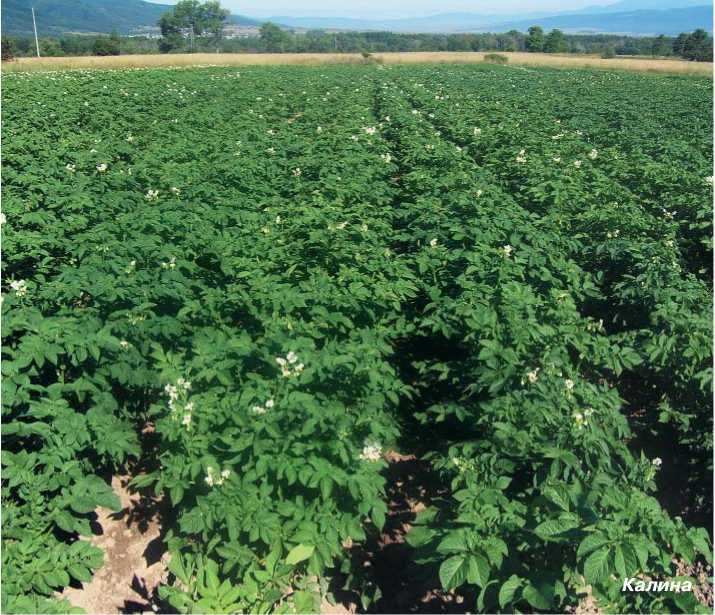
Table 1.
Structure of yield in the production of certified potato seeds
|
Perun |
Kalina |
Bor |
|||||||||||||
|
Degree |
fractions |
Total yield (kg/da) |
fractions |
Total yield (kg/da) |
fractions |
Total yield (kg/da) |
|||||||||
|
< 25 mm |
25-35 mm |
35-60 mm |
> 60 mm |
< 25 mm |
25-35 mm |
35-60 mm |
> 60 mm |
< 25 mm |
25-35 mm |
35-60 mm |
> 60 mm |
||||
|
a 1 b 1 c 1 |
70 a |
654 ab |
1828 ns |
75 ns |
2627 g |
51 ns |
509 a |
1515 ns |
207 b |
2282 c |
47 a |
424 ab |
1543 ns |
310 ns |
2324 i |
|
a1 b1 c2 |
62 ab |
444 a-d |
1994 ns |
458 ns |
2958 d-g |
37 ns |
425 abc |
1783 ns |
327 ab |
2572 bc |
29 abc |
390 abc |
1763 ns |
440 ns |
2622 f-i |
|
a1 b2 c1 |
68 ab |
569 abc |
1908 ns |
260 ns |
2805 f-g |
37 ns |
283 abc |
1801 ns |
426 ab |
2547 bc |
29 abc |
230 cd |
1636 ns |
400 ns |
2295 i |
|
a1 b2 c2 |
50 ab |
362 cd |
2163 ns |
365 ns |
2940 d-g |
27 ns |
293 abc |
1914 ns |
522 ab |
2756 abc |
18 bc |
211 cd |
1750 ns |
518 ns |
2497 g-i |
|
a 2 b 1 c 1 |
56 ab |
696 a |
2101 ns |
120 ns |
2973 c-g |
43 ns |
430 abc |
2028 ns |
395 ab |
2896 abc |
37 ab |
360 a-d |
1996 ns |
457 ns |
2850 d-g |
|
a2 b1 c2 |
28 ab |
533 a-d |
2366 ns |
269 ns |
3196 a-e |
31 ns |
365 abc |
2152 ns |
586 ab |
3134 ab |
22 abc |
317 a-d |
2199 ns |
544 ns |
3082 a-e |
|
a2 b2 c1 |
44 ab |
440 a-d |
2068 ns |
291 ns |
2843 e-g |
24 ns |
370 abc |
1970 ns |
585 ab |
2949 abc |
15 bc |
240 cd |
2115 ns |
443 ns |
2813 e-h |
|
a2 b2 c2 |
39 ab |
281 d |
2355 ns |
494 ns |
3169 b-f |
25 ns |
225 bc |
2098 ns |
757 a |
3105 ab |
9 c |
194 d |
2192 ns |
556 ns |
2951 b-f |
|
a 3 b 1 c 1 |
53 ab |
560 abc |
2351 ns |
333 ns |
3297 a-d |
35 ns |
447 ab |
2148 ns |
485 ab |
3115 ab |
29 abc |
449 a |
2339 ns |
449 ns |
3266 abc |
|
a3 b1 c2 |
41 ab |
322 cd |
2800 ns |
393 ns |
3556 a |
25 ns |
307 abc |
2470 ns |
633 ab |
3435 a |
19 bc |
264 bcd |
2573 ns |
553 ns |
3409 a |
|
a3 b2 c1 |
29 ab |
468 a-d |
2263 ns |
402 ns |
3162 b-f |
30 ns |
230 bc |
2214 ns |
609 ab |
3083 ab |
18 bc |
249 bcd |
2271 ns |
702 ns |
3240 a-d |
|
a3 b2 c2 |
18 b |
292 d |
2508 ns |
563 ns |
3381 ab |
18 ns |
215 c |
2262 ns |
793 a |
3288 ab |
9 c |
207 cd |
2364 ns |
819 ns |
3399 a |
|
а1 (average) |
63 ab |
507 a-d |
1973 ns |
290 ns |
2833 e-g |
38 ns |
377 abc |
1753 ns |
371 ab |
2539 bc |
31 abc |
314 a-d |
1673 ns |
417 ns |
2435 h-i |
|
а2 (average) |
42 ab |
488 a-d |
2223 ns |
293 ns |
3046 b-f |
31 ns |
347 abc |
2062 ns |
581 ab |
3021 abc |
21 abc |
278 a-d |
2126 ns |
500 ns |
2925 b-f |
|
а3 (average) |
35 ab |
411 b-d |
2481 ns |
423 ns |
3349 a-c |
27 ns |
300 abc |
2274 ns |
630 ab |
3231 ab |
18 bc |
292 a-d |
2387 ns |
631 ns |
3328 ab |
|
b1 (average) |
52 ab |
535 a-d |
2240 ns |
275 ns |
3101 b-f |
37 ns |
414 abc |
2016 ns |
439 ab |
2906 abc |
30 abc |
367 a-d |
2069 ns |
459 ns |
2925 b-f |
|
b2 (average) |
41 ab |
402 b-d |
2211 ns |
396 ns |
3050 b-f |
27 ns |
269 bc |
2043 ns |
615 ab |
2954 abc |
16 bc |
222 cd |
2054 ns |
573 ns |
2865 c-g |
|
с1 (average) |
53 ab |
565 abc |
2087 ns |
247 ns |
2951 d-g |
37 ns |
378 abc |
1946 ns |
451 ab |
2812 abc |
29 abc |
325 a-d |
1983 ns |
460 ns |
2797 e-h |
|
с2 (average) |
40 ab |
372 cd |
2364 ns |
424 ns |
3200 a-e |
27 ns |
305 abc |
2113 ns |
603 ab |
3048 ab |
18 bc |
264 bcd |
2140 ns |
572 ns |
2994 b-f |
|
Mean value |
47 |
468 |
2225 |
335 |
3076 |
32 |
341 |
2030 |
527 |
2930 |
23 |
295 |
2062 |
516 |
2896 |
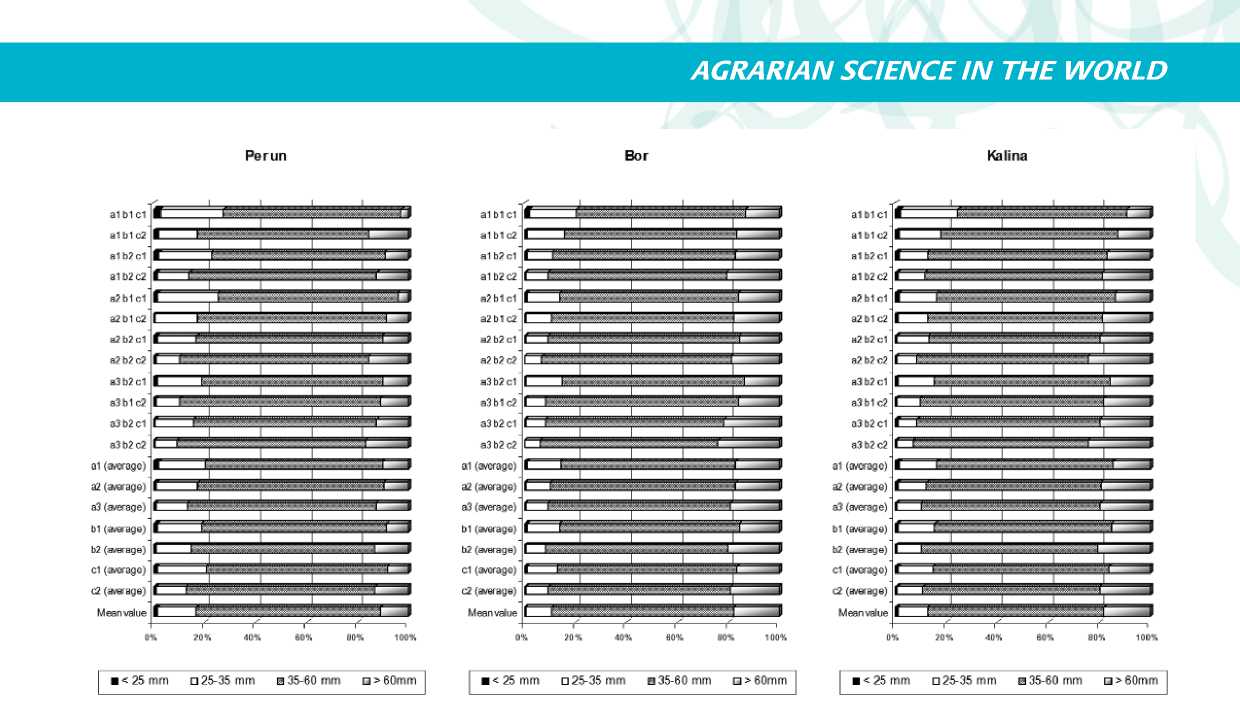
Figure 1. Percentage of yield distribution fractions obtained from varieties Perun, Kalina and Bor
um fertilization, 22 cm planting density and term of leaf striping 30 days after mass blossoming. The highest yield (70 kg/da) was recorded in the variant of fertilization N16 P14 K18, 18 cm planting density and term of leaf striping 20 day after mass blossoming. The minimum and the maximum values of non standard yield in fraction less than 2,5 cm in the varieties Kalina and Bor were recorded in the same two combinations, but the amplitude of variation is lower (18-51 kg/da in Kalina and 9-47 kg/da in Bor). The amount of this non-standard fraction decreases with increase of the fertilization rate with nitrogen and potassium, distance in the row and duration of leaf striping. The percentage expression of the fraction as a part of
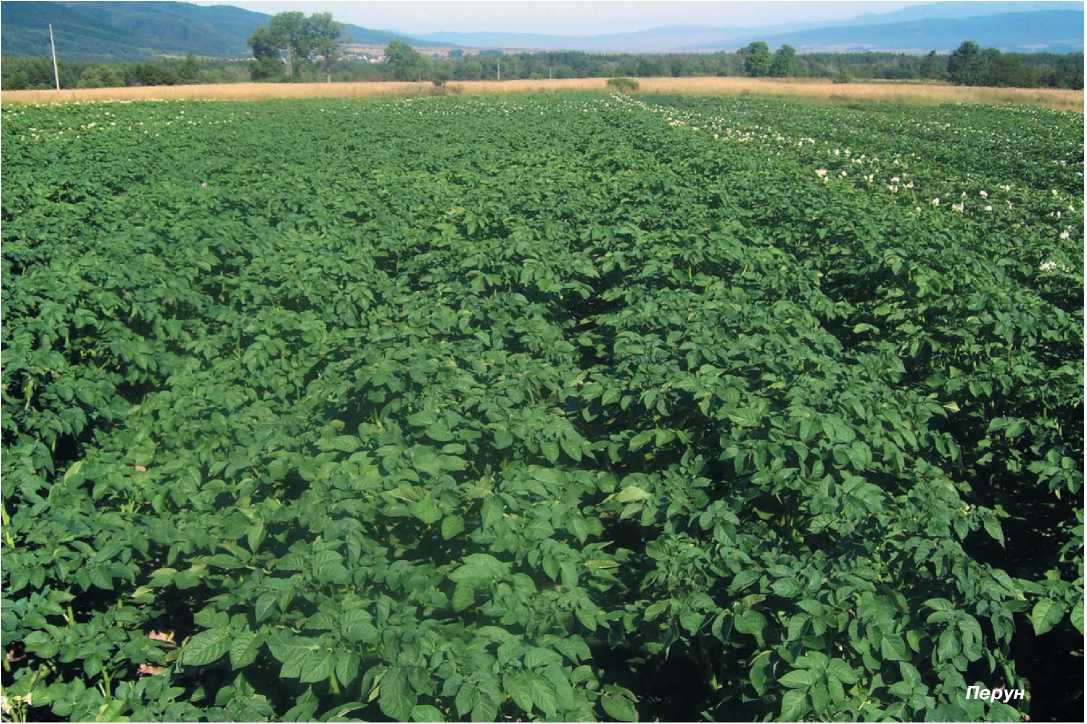

| □< 25 mm 125-35 mm И35-60 mm D> 60mm 1

I □< 25 mm 125-35 mm В35-60 mm D>60mm |
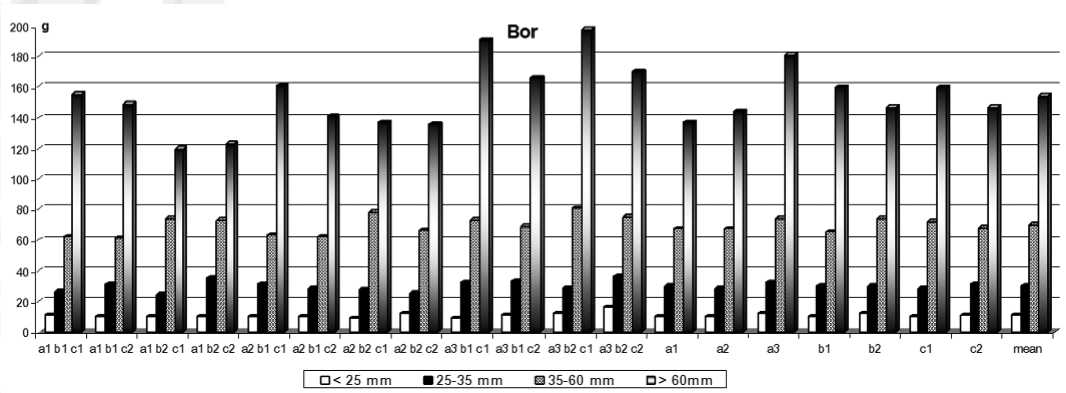
Figure 1. Percentage of yield distribution fractions obtained from varieties Perun, Kalina and Bor
total yield per variety is comparatively small (Figure 1) and varies from 0,5 to 2,7 % in Perun, 0,5-2,2 % in Kalina and 0,32,0 % in Bor. The average weight of tubers in this fraction is 9-17 g (Figure 2).
The yield of small seed fraction (2535 mm) varies from 194 kg/da (Bor, variant N18 P14 K18, 22 cm planting density and term of leaf striping 30 day after mass blossoming) to 696 kg/da (Perun, in variant including the increased rate of nitrogen fertilization, 18 cm planting density and term of leaf striping 20 days after mass blossoming). Its average absolute value is 468 kg/da for the vari- ety Perun and in percentage – 15,2 % with an average weight of tubers 28 g, 341 kg/da for the variety Kalina and in percentage – 11,6 % with an average weight of tubers 30 g, and 295 kg/da for the variety Bor and in percentage – 10,2 % with an average weight of tubers 30 g. The maximal expression of this fraction is recorded in the variants including 18 cm planting density and term of leaf striping 20 days after blossoming. The amount of the fraction (25-35 mm) decreases with increase of nitrogen fertilization rate, of distance in the row and of duration of term for leaf striping. The percentage expression of the fraction as a part of total yield for each variant is with amplitude of variation from 6,1 to 24,9 %, and an average weight of tubers from 22 to 38 g.
The fraction 35-60 mm is described as having the highest percentage of the total yield – average 72,4 % and in absolute value – 2225 kg/da for the variety Perun, 69,3 % and in absolute value – 2030 kg/da for the variety Kalina, and 71,2 % and in absolute value – 2062 kg/da for the variety Bor. The yield in the large seed fraction varies from 1515 kg/da (Kalina, in the variant N16 P14 K18, term of leaf striping 20 days after mass blossoming and 18 cm planting density)
to 2800 kg/da (Perun, in the variant N18 P14 K22, term of leaf striping 30 days after mass blossoming and 18 cm planting density), and the average weight of tubers varies from 51 to 81 g. The maximal value for all Bulgarian varieties was recorded in the variant with the increased rate of nitrogen and potassium fertilization, 18 cm planting density and term of leaf striping 30 day after mass blossoming. The seed amount from this fraction increases with the increase of N and K fertilization rate and duration of leaf striping term. Its percentage is with amplitude from 66,4 to 78,7 %.
The yield of the non-standard fraction of the large tubers with 6 cm diameter in different combinations varies from 75 to 819 kg/da, its percentage – from 2,9 to 24,4 %, and the average tuber weight varies from 104 to 217 g. The higher dose of nitrogen and potassium fertilization, the larger distance of planting and the more late term of leaf striping have an unfavorable effect, for example they increase the proportion of non-standard large tuber.
Conclusions
The significant differences in the yield structure determined by fractions, depending on the influence of fertilizing rate, planting density and term of leaf striping were recorded in the production of certified potato seeds.
The total yield of certified seeds of the Bulgarian potato varieties Perun, Kalina and Bor varies from 2282 to 3556 kg/da. The total yield increases significantly with the increase of nitrogen and potassium fertilization rate, planting density and the duration of term of leaf striping.
The percentage of the non-standard tubers with size below 2,5 cm is the lowest (in average 1,1 %) among the total produce.
The percentage of the fraction of the small seeds with diameter from 2,5 to 3,5 cm is within the limits 6,1 to 24,9 %. The maximal expression of this fraction is recorded in the variants including 18 cm planting density and term of leaf striping 20 days after blossoming.
The amount of the fraction of large seeds with size from 3,5 to 6 сm varies from 66,4 to 78,7%.
The yield of the non-standard large tubers with diameter over 6 cm is averagely 460 kg/da, that is 15,6 % from the total produce. The more dense planting and earlier term of leaf striping can positively influence on reduction of this fraction.
Список литературы Yield structure in the production of certified seeds from bulgarian potato varieties
- Amelyushkina T., Semeshkina P., Anisimov B., 2008. The effect of leaf stripping and protective measure data on potato seed material. Potato culture: research results, innovations, practice. Materials of scientific and practical conference Scientific Supply and Innovative Development of Potato Culture (v. 1), p. 369-376.
- Callihan R., R. Mc Dole, P. Mann, 2007. The influence of nitrogen and phosphorus fertilization on periderm anatomy in Russet Burbank potatoes. American Journal of Potato Research, Volume 50, Number 10, 380-387,
- Duncan, D., 1955. Multiple range and multiple F tests. Biometrics. 11: 1-42
- Muletarova, S., E. Nacheva, 1995. Monitoring of the viral diseases on potatoes of the main seed productive regions. Higher Institute of Agriculture-Plovdiv, Scientific Works, v. III, book 2, 15-18.
- Nikolov P., Laginova M., Dimitrova L. 2008. The potato wart disease in Bulgaria -symptoms, speading and response of the varieties Plant Science (Bulgaria) v. 45(1) p. 28-31.
- Petrov N., D. Khristova, C. Heinze, P. Willingman, G. Adam, 2008. Identification of the Virus, Causing Necrotic Ring Spots on Potato Tubers in Bulgaria. Plant Science (Bulgaria) v. 45(5) p. 407-411.
- Plotnytska, O.V., Vermenko, Yu, 2007. Productivity of seed potato depending on phytosanitary growing conditions. Ahrarna Nauka, issue 36, p. 74-78.
- Samaliev H., O. Baicheva, A. Aleksiev, 1995. Identification of potato cyst nematode/Globodera pallida/in Bulgaria. Higher Institute of Agriculture-Plovdiv, Scientific Works, v. XI, book 3, p. 251-255.
- Trifonova Z., V. Blagoeva, 2008. Resistance of lines and potato cultivars to Globodera rostochiensis. Plant Science (Bulgaria) v. 45(3) p. 218-221.
- Yang X., H. Tian, J. Wei, 2009. Effect of different sowing method and population density on seed potato production. Southwest China Journal of Agricultural Sciences, p. 4-9.

